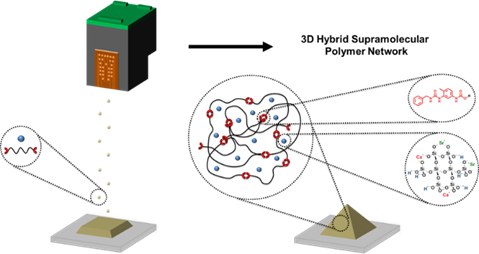Feeding the pipeline for high throughput formulation
Researchers
Lewis Hart (University of Reading)
Lewis is currently developing biocompatible supramolecular polymer networks which are able to efficiently self-assemble from low molecular weight macromonomers via highly directional non-covalent interactions to form a pseudo-high molecular weight polymer networks. In addition, composite materials are also being established to formulate hybrid inks to enhance the mechanical properties of the deposited features.

Self-assembly of deposited supramolecular polymer composite to produce 3D structures.

Lea Santu (University of Nottingham)
The project focus within this research challenge is to produce novel and sustainable predominantly organic-based low molecular weight gelators (LMWG) library for RC1 in order to meet the process and sector constraints concerning additive manufacturing.
These LMWG have many potential for applications such as pharmaceutical (tissues engineering, drug delivery and optoelectronics), petrochemical and many others. Their use as new materials for 3D printing can have significant potential application in forming complex hierarchical structures for interesting application in various sectors.
PhD Students
Sara Salimi (University of Reading)
Project: Synthesis of Responsive Materials for 3D Printing
Supervisor: Wayne Hayes
Conventionally, high molecular weight polymers are desirable in 3D printing as they result in strong, durable and high impact resistant printed parts. They can be challenging to print as a result of high viscosity and poor processability in melt and solution. To address this, supramolecular polymers are being investigated. These pseudo-high molecular weight polymers offer lower viscosity with tuneable properties and form a stiff and durable structure upon deposition. My project involves synthesis and characterisation of stiff, yet elastomeric supramolecular polymers and reinforcing them by different physical and chemical methods.
Glenieliz- Glyssa Dizon (University of Nottingham)
Project: Synthesis of Sustainable Gelators for Additive Manufacturing
Supervisor: David Amabilino
Due to her background in organic and synthetic chemistry, Glyssa is working on the synthesis of molecular gelators for applications in 3D printing and drug delivery using the principles of green chemistry. She will be planning the synthetic routes carefully ensuring that green and renewable starting materials, reagents and solvents are used. Characterisation of the gels will be performed by visual inspection, optical and electron microscopy and rheology measurements. She will also be involved in employing these materials in additive manufacturing formulation.